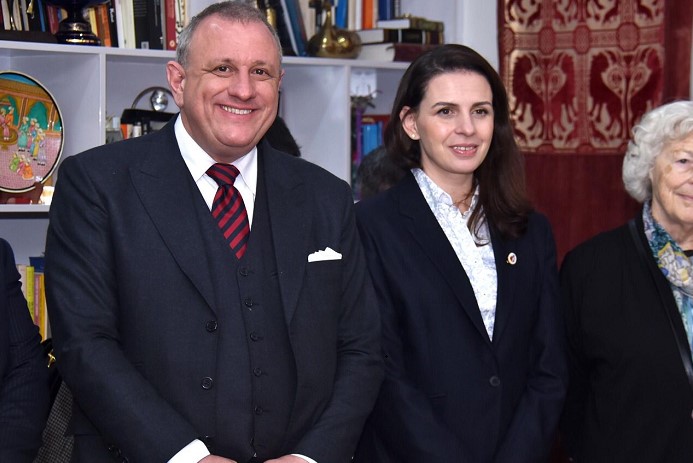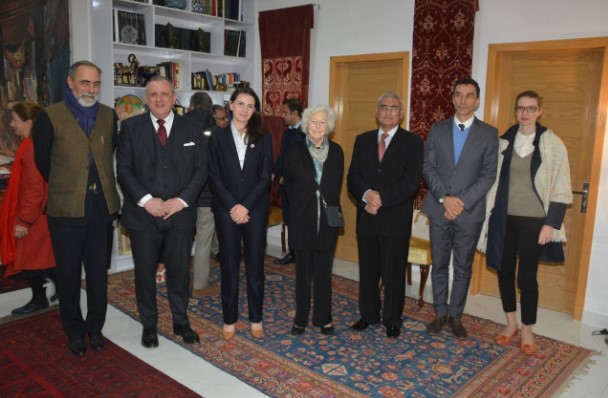Ambassador Andreas Ferrarese, Albana Ferrarese host wonderful evening for globally known Italian archaeologist Luca M. Olivieri

A big archaeological discovery announced
Islamabad: Italy’s Ambassador to Pakistan Andreas Ferrarese and his wife Albana Ferrarese on Monday evening hosted a wonderful evening here at their residence where globally known Italian archaeologist Luca M. Olivieri announced a big archaeological discovery.
This year’s excavation brought to light the Shahi Vishnuite temple in its entirety. As it is known, of the temple remain only the podium, the related floors, conspicuous part of the decoration with pilasters with pseudo-ionic capitals, remarkable examples of the original marble decoration of the Turki Shahi period.

Speaking at the reception, Olivieri said at the end of the month of October, a series of robbers’ pits in the central zone of the ancient city was explored and it revealed a very important Buddhist monument, preserved despite the robbers’ vandalism. At the sides of the monument there is a minor stupa, a cell and the podium of a monumental pillar.
The most interesting information comes from the pre-Saka phases of the monument which, with a slightly different form, dates back to the Maurya period and later Indo-Greek as confirmed by coins and pottery found there. The phases presented features dating both to the Iron Age and, after a deep layer of alluvium, at about 8 meters from the data point, pertaining to the Chalcolithic, he added.
During an excavation in November 2021 in north-west of the main urban exposure of Barikot, we discovered a row of graves of unknown age and other archaeological features. These graves contain pottery shards and other rare finds which could date back(typologically and preliminarily) to the Indo-Greek and Saka-Parthian period, Olivieri said.
At the end of the excavations more than 2200 objects (sculptures, coins, inscriptions, ceramics, ornaments, iron weapons, stone tools) were found, restored and handed over to the Khyber Pakhtunkhaw government.

The Italian Archaeological Mission in Pakistan started sondages at Bir-kot-ghwandai (Bazira) in 1977 when Prof. Giorgio Stacul discovered the earliest sequence of the site (1700-800 BCE) with important discoveries of a typical painted pottery of Chalcolitic period. It was only later that the signs of the old city of Bazira were found (1984) in a trial trench by Prof. Pierfrancesco Callieri. In 1985, the defensive wall and a bastion of the city of Bazira were discovered. From the year 1990 to 1992, south-western corner of the old city were dug out. From 1993 to 1995, survey of the entire area was conducted. In 1996, the whole ghwandai (hill) was acquired on lease.
From the year 1998 till 2000, excavations on the upper top of Bir-kot-ghwandai were carried out. In this work, the Hindu Shahi temple and other relics ranging from Bronze Age till the Ghanavid period were discovered. During years 2004-2007, fieldwork on the rock painting sites was conducted in the Kandak and other areas by the Italian Archaeological Mission. The excavation work was resumed in 2009,which continuestill date. During this period (2009-2021) twenty one excavation seasons have been carried out.

In the year 2014, work under the joint Italian Archaeological Mission-DOAM KPK, the ACT Project was conducted in Abba Sahib-chinah, Amluk-dara, Balo Kalay/Gumbat, Bazira, Saidu Sharif I, Jahanabad, and in the Ghaznavid mosque at Udegram. Most of the work under the ACT Project (Archaeology, Community, Tourism – Field School) was that of restoration.
The Italian government spent 2.45 million Euro under the ACT Project (which included the reconstruction of the Swat Museum and the restoration of the colossal Jahanabad Buddha).
The work on the hill continued and the excavation area was investigated to uncover the western sectors of the Shahi-era fortress (800-1000 CE), which was later renovated in the Ghaznavid era (c. 1020-1080 CE).
The fortress served both military and observation purposes, being the place of greatest visual possession, with a capacity to control from Mingora to Chakdara, from Parrai to the Karakar pass, but also to control the important cistern of the coeval Vishnuite temple below.
As usual, Ambassador Andreas Ferrarese and his wife Albana Ferrarese greeted each guest individually making them feel important. The popular diplomatic couple, have been celebrating each achievement of Italy since they came to Pakistan,
Pakistan-Italy ties have improved significantly since Ambassador Andreas Ferrarese’s started his tenure.
Welcoming the guests at the reception, Ambassador Ferrarese said Italy and Pakistan were traditional; friends and have been cooperating with each other for ages.
He said Italy is always willing to help Pakiostan in all sectors. He pointed out that people like Luca M. Olivieri had proven that they loves Pakistan.
He said Italian businesspersons had also invested in Pakistan and both the countries had supported each other at the diplomatic level too,
Ambassador Ferrarese pledged to continue the supportive role in the future and strengthen the friendship further. A galaxy of journalists, diplomats and government officials attended the event.
At the end Ambassador Andreas Ferrarese and Albana Ferrarese treated the guests with a lavish lunch which was a mix of Italian and Pakistani cuisine.





